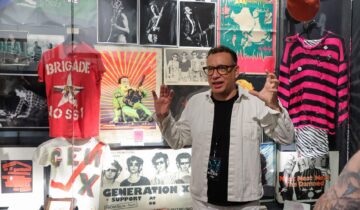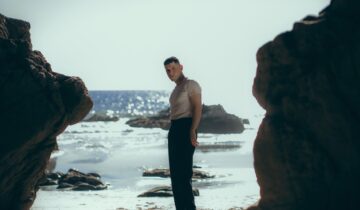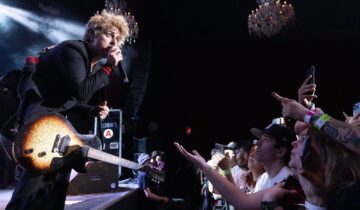 As South by Southwest 2024 kicks off, preview some of the most exciting performances, music film screenings, and music-related keynotes that will hit Austin stages.
As South by Southwest 2024 kicks off, preview some of the most exciting performances, music film screenings, and music-related keynotes that will hit Austin stages.
Story for GRAMMY.com on March 11, 2024
South By Southwest lures more than 250,000 people to Austin each year to learn about a range of topics, including education, the cannabis industry, technology, film, and video gaming, but music is the heart and driving force of SXSW. The festival kicks off March 8, and a dizzying array of musical performances brings the festival to life from March 11 to 16.
The festival has grown exponentially since its inception in 1987 as a showcase for mostly unknown alternative acts. Roughly 2,000 musical artists will perform on more than 100 stages spread out across Austin and the possibilities for discovery feel endless.
SXSW can generate much buzz and help launch careers: Odd Future, the hip-hop/R&B collective that provided the springboard for Tyler, the Creator and Frank Ocean, played just a few short sets there in 2011, and Diddy declared them the future of rap music. HAIM, Janelle Monáe, John Mayer, M.I.A., and countless others have had significant early-career moments at SXSW. And legacy artists like New Order and RZA also come to the festival each year to share their wisdom in interviews and perform new material.
As the 2024 festival kicks off, check out some of the emerging and legacy artists appearing at SXSW, including a multiple GRAMMY-winning garage duo, an all-female post-punk group from Los Angeles that embraces “nihilism and loneliness,” a modern Texas cumbia collective, an ’80s light rock icon, a funk pioneer, modern funk innovators, Glasgow ’90s post-rock, and more.
The Black Keys
The Black Keys helped usher in the garage rock revival of the early 2000s on just two instruments: drums and guitar. Their stripped-down sound, originally just made up of “old blues rip-offs and words made up on the spot” in Akron, Ohio, eventually grew to become a well-crafted, major-label rock sound that landed them in arenas and earned more than two dozen award nominations and multiple GRAMMY wins. They’ve released 11 studio albums.
The duo will perform at the 2024 festival in support of a new documentary, This Is A Film About The Black Keys, that traces their trajectory from jamming in basements to major-label rock band. Rolling Stone Senior Writer Angie Martoccio will interview members Dan Auerbach and Patrick Carney in a keynote event.
Automatic
Since the release of their 2019 debut album, Signal, the gloomy post-punk band Automatic has toured the U.S. and abroad, composed the soundtrack for Hedi Slimane’s 2020 Paris Fashion Week show for Céline, and opened for legendary post-punks Bauhaus ( drummer Lola Dompé is a daughter of the English goth rock band’s drummer Kevin Haskins).
The band’s three members — Dompé, Izzy Glaudini, and Halle Saxon-Gaines — draw inspiration from krautrock, dub reggae, and the off-kilter, moody atmosphere of films by auteurs like David Lynch. Their live performances are uptempo and melancholy at the same time, and have shared stages with Parquet Courts, Tame Impala, and Thee Osees. Automatic once described their music as “fixated on the intersection between ’70s underground culture and the ’80s mainstream, ‘That fleeting moment when what was once cool quickly turned and became mainstream, all for the sake of consumerism.’”
Mogwai
When the Glasgow-based rock band released their first single in 1996, they were anxious to replace the ’90s Britpop of well-known UK bands like Oasis and Blur with something a bit more emotional and dark: lengthy guitar-based instrumental pieces full of distortion and heavy effects that offered dynamic contrast and melodic bass guitar lines.
They’ve since gone on to embrace electronica and instrumental music, and over the years has provided music for multiple film soundtracks. Their basic song formula typically begins with something low-key that grows into something gentle and melodic, and then pushes toward louder, layered driving rock.
“Calling it ‘art’ would be a pretentious step too far, but it’s certainly something that feels exciting and different to most other pop,” one British newspaper wrote. A new documentary from Antony Crook, If The Stars Had A Sound, which follows the independent Scottish band’s trajectory, will premiere at SXSW 2024.
El Combo Oscuro
Modern-day interpretations of cumbia — a percussion-heavy genre of Latin American music originated in Colombia — have become more widespread in recent years, with some calling cumbia “the new punk” for a young generation of rockers who are politically engaged but want to have a good time.
On organ, guitars, bass, drums, and conga drums, El Combo Oscuro sounds modern and retro at the same time, by weaving together an “impenetrable wall of psychedelic Cumbia and Latin sounds” that “throws neon Tex-Mex tribalism,” according to the Austin Chronicle.
Almost immediately after forming in 2020 in Austin, El Combo Oscuro were nominated for an Austin Music Awards’ Best Latin Act, and their debut EP, Que Sonido Tan Rico, was No. 15 on the Austin Chronicle’s Top 100 Records of 2021. A second EP, 2022’s Cumbia Capital, further showcased the sound of Texas. Their 2024 SXSW performance will also feature songs from their latest release, a 2023 debut full-length titled La Danza de las Sirenas.
Bootsy Collins
In addition to showcasing thousands of emerging acts, SXSW each year also honors legacy artists who continue to write, produce, and perform music. Bassist Bootsy Collins — who played with James Brown and Parliament-Funkadelic throughout the late ’60s and ’70s and, in recent years, has collaborated with Kali Uchis and Tyler, the Creator — will perform with the group Zapp.
The performance is part of Bootsy’s own anti-violence initiative, “Funk Not Fight,” which includes a Cleveland-based (Collins is from Ohio) anti-violence hub designed to offer music recording and mentorship to local youth. During a free performance on March 15, Collins will release a new song and album of the same name.
Collins’ previous album was 2021’s Nobody’s Perfect Experience. The GRAMMY-winning bassist was also inducted into the Rock and Roll Hall of Fame in 1997 with other members of Parliament-Funkadelic. Collins played on some of James Brown’s best-known and most political records – “Get Up (I Feel Like Being a) Sex Machine” and “Superbad” – and also had a hand in pop hits like Deee-Lite’s “Groove Is in the Heart” and Fatboy Slim’s “Weapon of Choice.”
At 72 years old, Collins shows no signs of giving up the funk. “Funk just brings people together, from the ground up,” he told the Guardian. “It doesn’t have nothing to do with color. It has nothing to do with status. It just brings you to ‘the one’, and the one thing that we all have in common is that we all just want to live. That’s what it’s really all about. It’s making something from nothing, like me.”
John Oates
John Oats is one half of five-time GRAMMY-nominated pop-soul duo Hall & Oates. Twenty-nine of their 33 singles charted on Billboard’s Hot 100 between 1974 and 1991, and six of those songs — like “I Can’t Go For That” and “Private Eyes” — peaked at No. 1 . The two were inducted into the Rock & Roll Hall of Fame in 2014 and their music has been sampled by artists like 2 Chainz.
Oates, 75, has released five studio albums as a solo artist and published a memoir in 2017 titled Change of Seasons.
“I made a move to Nashville in the late ’90s, early 2000s. The move, and the musicians and people I surrounded myself with, allowed me to rediscover the musician that I was before I met Daryl Hall,” Oates told GRAMMY.com. “Because I was a blues, folk, rootsy musician, and I tapped back into my earliest influences.
At SXSW 2024, Oates will discuss fame, fortune, and managing a hit music career. His talk will be moderated by Alex Heiche, CEO & Founder of Sound Royalties. Coincidentally, Oates has been in the middle of a legal battle with his former songwriting partner.
Slick Rick
When asked about hip-hop icon Slick Rick, Roots drummer and Tonight Show bandleader Ahmir “Questlove” Thompson told Rolling Stone, “Slick Rick’s voice was the most beautiful thing to happen to hip-hop culture. Rick is full of punchlines, wit, melody, cool cadence, confidence and style. He is the blueprint.”
Slick Rick “The Ruler” — largely considered the most sampled hip-hop artist in history — launched his career performing with Doug E. Fresh’s Get Fresh Crew in the mid-80s, and his 1988 breakout solo album reached number one on Billboard’s R&B/Hip-Hop chart. Slick Rick has recently collaborated with Soul Rebels Brass Band. He received a Lifetime Achievement Award at the 2023 GRAMMYs, to honor his legacy as a masterful storyteller and pioneering melodic rapper who raps in a British accent with a leisurely cadence and an unforgettably nasal voice that sometimes swerves into cartoony vocal tones.
In recent years, Slick Rick has collaborated with Missy Elliott, Mos Def, and the Black Eyed Peas. He performed a duet with Mariah Carey at Radio City Music Hall in 2019, and was signed to actor Idris Alba’s record label. He will perform an all-ages showcase performance — badge-required — at The Mohawk on March 12.
BALTHVS
Funk music in recent years has taken on a more global sound, incorporating elements of Asian and Middle Eastern music, surf rock, reggae, and cumbia, thanks to bands like Khruangbin and BALTHVS, a Colombian psychedelic funk trio that has toured the world and released three full-length albums since forming in 2019. The band aims to make “cosmic music” that can combat anger and anxiety.
Band members Balthazar Aguirre (guitar), Johanna Mercuriana (bass), and Santiago Lizcano (drums) produce, mix, and master all of their music and design all of their artwork. Their most recently release, Third Vibration, incorporates funk, disco, dream pop, vaporwave, soul, and R&B into their songs.
Aguirre hypes those genres and more on his Cubensis Records YouTube page, where subscribers can better understand the BALTHVS universe by exploring a vast library of eclectic music, like the mystical 1968 Gabor Szabo album “Dreams,” or Stefano Torossi’s 1974 Italian jazz fusion album “Feelings.” For super fans, it’s a giant rabbit hole of discovery that helps illustrate the band’s musical recipe.
Brainstory
Brainstory is another modern funk outfit with an eclectic musical blueprint: the three members of Brainstory grew up in the Inland Empire area outside Los Angeles, and by the mid-2010s, they were developing a version of California retro soul music that combines jazz and funk with psychedelic rock and 70s R&B.
“That’s what we were all into at the time—jazz,” says guitarist and singer Kevin Martin, who happens to be a big Bob Dylan fan. “And that’s what we wanted to do with our first EP in 2014—take our songs and expand them, improvise, weld jazz onto them. We wanted to trick people into listening to jazz, basically.”
The band, made up of Kevin, his brother Tony Martin, and Eric Hagstrom, has released one full-length album, an instrumental album, and an EP. Their new record, Sounds Good, produced for Big Crown Records by Leon Michels — who recently collaborated with Black Thought of the Roots — drops on April 19. The band is touring this spring. Previously they’ve performed with soul singer Lady Wray, and singer Claire “Clairo” Cottrill has a guest feature on the new album.
Vulva Voce
SXSW is more associated with rock music than classical, but the UK-based, all-female string quartet Vulva Voce has applied a rock attitude to their ensemble. Formed during Covid lockdown, they compose much of their own music — which combines elements of folk, jazz, contemporary, and experimental music.
“In terms of our identity — and especially in terms of our business model — we treat ourselves like a band rather than a classical string quartet,” violist Nadia Eskandari said.
Vulva Voce also employ a bit of a punk attitude, performing outside classical concert halls, at open mic nights and pop-up performances. They also play a wide range of music written by female composers.
“We want all the music we play to feel accessible to anyone, because when you are playing music by women, it is even more important that anyone can connect to it, not just classical audiences,” Eskandari adds.



